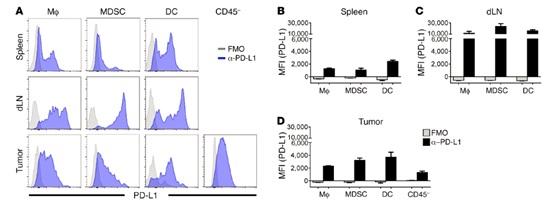New insight into checkpoint blockade for tumor therapy
The research work entitled ‘PD-L1 on host cells is essential for PD-L1 blockade–mediated tumor regression’was published online in The Journal of Clinical Investigation as an article on January16, 2018. In the study, scientists explored whether PD-L1 on tumor or host cells was essential for anti–PD-L1–mediated therapy in the murine tumor models.
The programmed death-1 receptor/programmed death–ligand 1 (PD-1/PD-L1) signaling pathway plays an important role in tumor evasion of host immune responses. Recent clinical trials withPD-1/PD-L1 blockade therapy have shown unprecedented durable response in patients with a variety of cancers. However,only a minority of patients benefits from such therapy. Thus, ithas become a top priority to identify biomarkers that can predictpatient responses. It has been suggested that PD-L1 on tumor cells plays an important role in preventing T cell–mediated killing. Higher expression of PD-L1 on tumor cells has been shown to be associated with a better immune response after checkpoint blockade. However, clinical responses were also observed in some patients that were negative for PD-L1 in tumors. The contributions of PD-L1 expression from relevant cells to inhibition of T cell responses remains unknown.
In this research work, they found that PD-L1in tumor cells is dispensable for the responses to PD-L1 blockade therapy after tumor establishment in 3 different models(MC38, A20, and E.G7). Anti–PD-L1 Abs accumulate in tumor tissues regardless of the status of tumor-expressed PD-L1. By using a mixed bone marrow chimera model, they further show that PD-L1 expressed in myeloid cells is essential. PD-L1 is not only highly expressed in myeloid cells, but also contributes to the inhibition of T cell activation. Blocking PD-L1 signaling by Ab releases such inhibition, leading to better T cell activation. These data suggest that blocking PD-L1 signaling in myeloid cells is essential for tumor control. Together, these findings further demonstrate that PD-L1 expressed in APCs, even outside tumor tissues, plays an essential role in checkpoint blockade therapy, providing new insight into the mechanisms and potential biomarkers of checkpoint blockade therapy.
Professor Yang-Xin Fu, Dr. Hua Peng from the Institute of Biophysics (IBP)of the Chinese Academy of Sciences and the University of Texas Southwestern Medical Center (UTSW), in cooperation with Professor Haidong Dong, in Mayo Clinic, are the corresponding authors. This study was supported by the Strategic Priority Research Program of the Chinese Academy of Sciences and the Chinese Ministry of Science and Technology.
Article linkage: https://jci.org/articles/view/96061

Figure1. The expressing profile of PD-L1 in tissues of tumor bearing mice

Figure2. Host PD-L1 is essential for the responses to PD-L1 blockade
By Yangxin Fu research group

